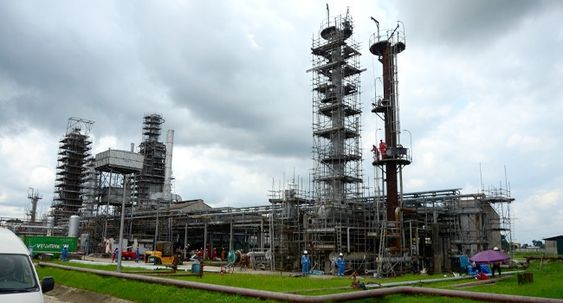Business
After years of closure, Port Harcourt Refinery restarts its operations

The Port Harcourt Refining Company in Rivers State has resumed operations in accordance with the Federal Government’s commitment to producing refined products at the facility by December 2023.
This development follows years of underperformance and maintenance work at the facility. Nigeria’s refineries in Port Harcourt, Warri, and Kaduna have a combined capacity to process 445,000 barrels per day (bpd). However, they were shut down in 2019.
In August, the Minister of State for Petroleum Resources (Oil), Senator Heineken Lokpobiri, announced that the Port Harcourt refinery would resume operations in December. He made this statement during an inspection tour of the rehabilitation work at the PHRC Ltd. plant.
“Our objective today is to ensure that Nigeria stops importing fuel in the next few years. Based on what we have seen here today, the Port Harcourt Refinery will be operational by the end of the year,” Lokpobiri stated in August.
The recommencement of operations at the Port Harcourt refinery comes after the Federal Government approved $1.5 billion (1.2 billion euros) in funding to repair one of its largest oil refineries over two years ago.
An Italian firm, Maire Tecnimont, was selected by the government to carry out the repair work at the Port Harcourt facility, which has a capacity of approximately 210,000 bpd.
“We are pleased to announce that the refinery’s rehabilitation will be carried out in three phases,” stated the then-Minister of Petroleum (State), Timipre Sylva, during a press briefing.
“The first phase will be completed within 18 months, bringing the refinery’s production to 90 percent of its nameplate capacity,” Sylva added. He also mentioned that the second phase would be completed in 24 months, followed by the third phase in 44 months.
Nigeria, despite being Africa’s top oil producer, has been heavily reliant on imported petroleum products due to a lack of domestic refining capabilities. This has resulted in frequent fuel shortages.
However, the government has been taking steps to revamp the Nigerian National Petroleum Company Limited (NNPCL) and enhance the capacity of the country’s underperforming state-owned refineries. The aim is to resume refinery operations and also initiate similar improvements at the Dangote Refinery.
These efforts are expected to enhance fuel supply in Africa’s largest oil producer and enable the country to save on refined fuel and other petroleum products. Additionally, with the removal of fuel subsidies, this move is anticipated to have an impact on the product’s cost.
